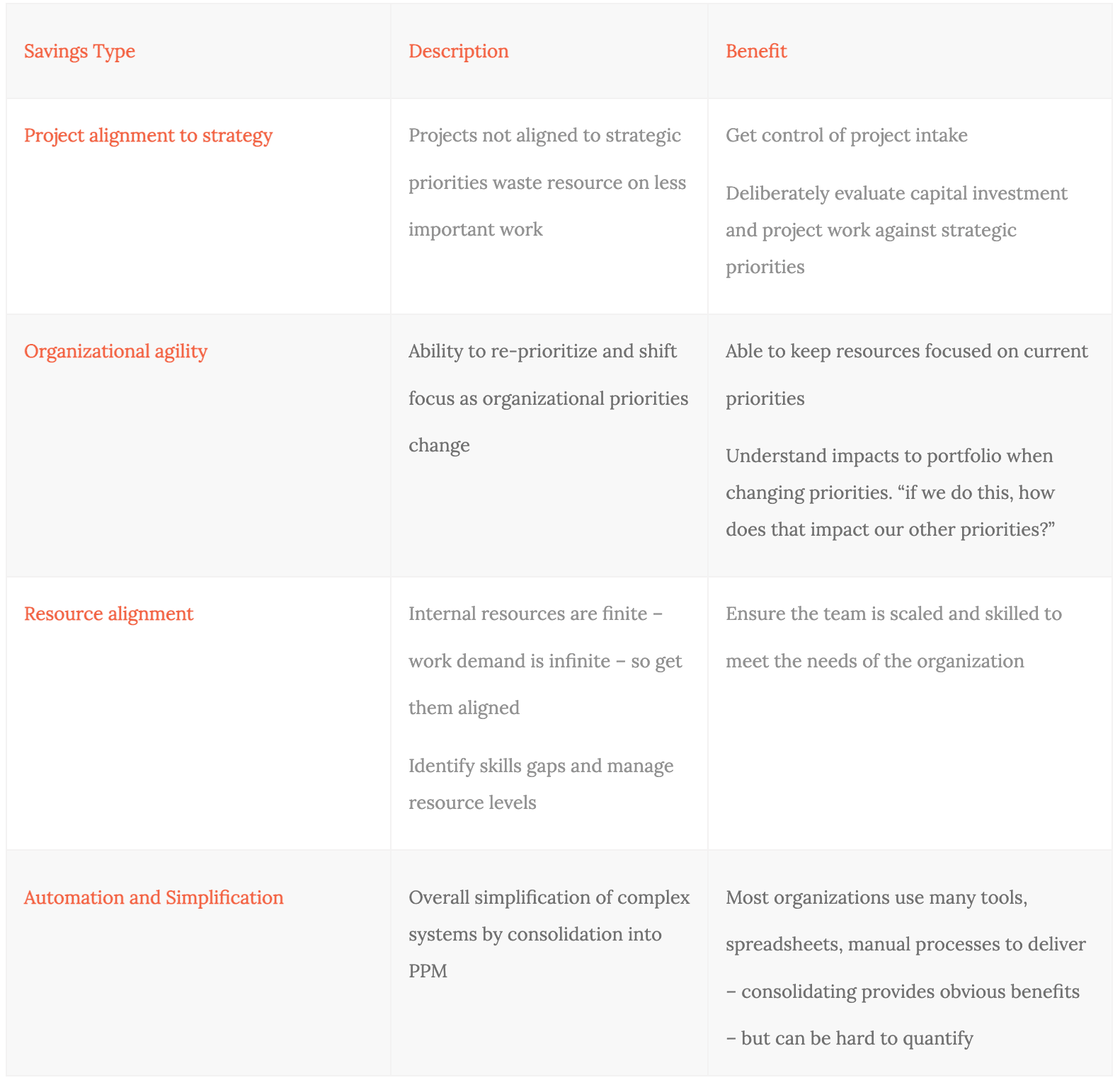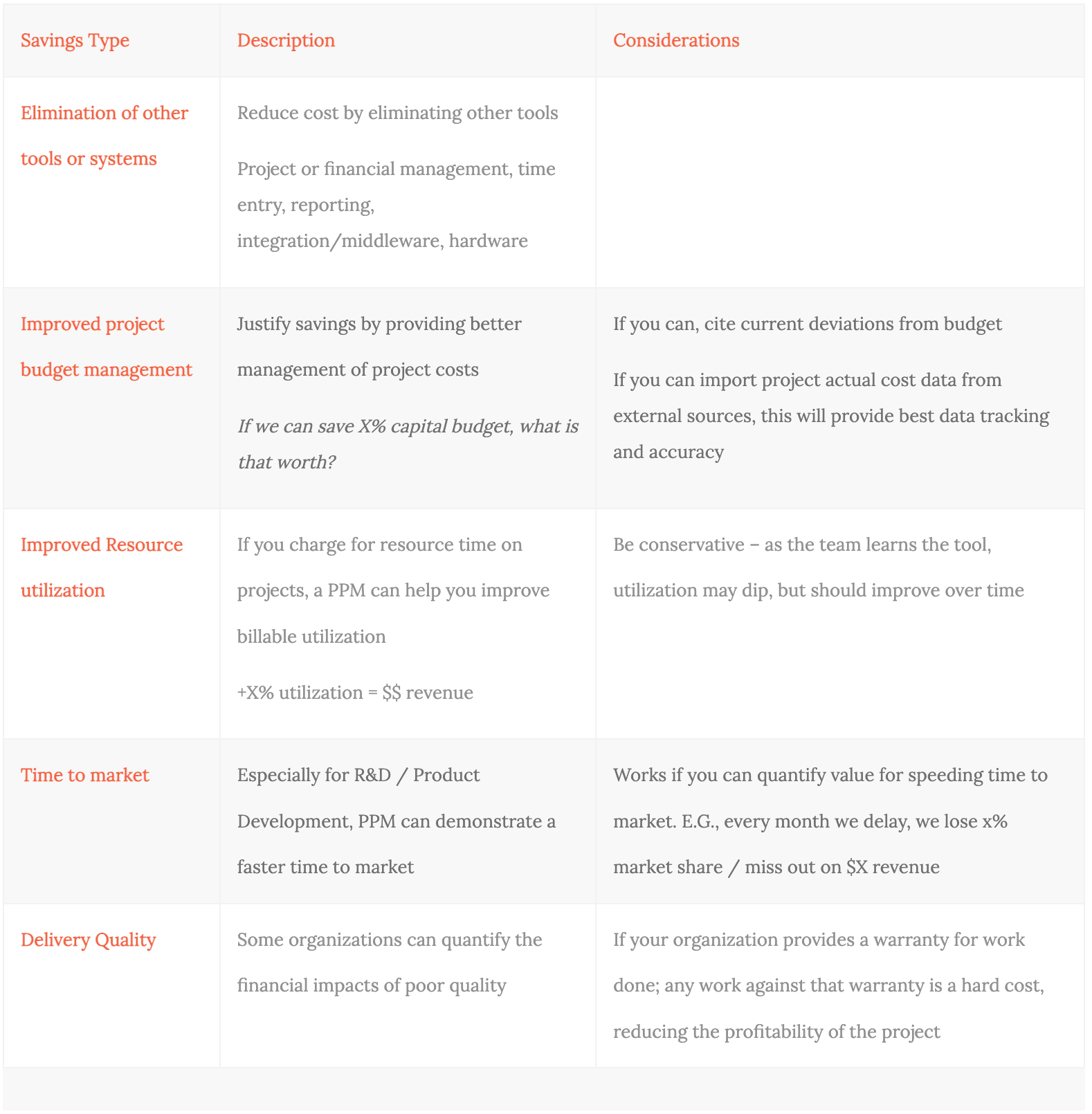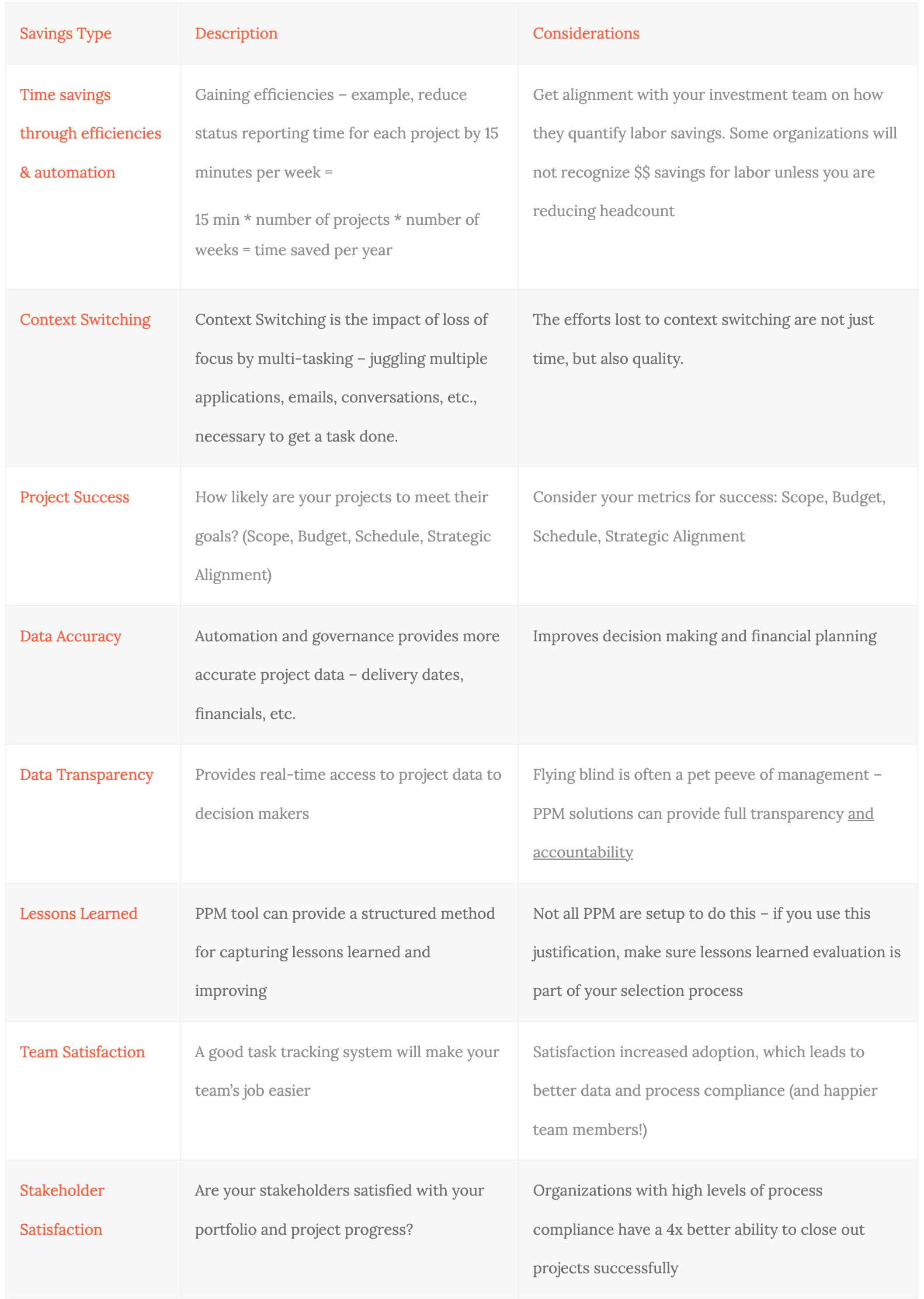Justifying a PPM Investment and running a project delivery organization is tough – and your organization is making this job even tougher if you don’t have a toolset. It’s hard to stay on top of the portfolio when your data is spread across dozens (or hundreds) of different spreadsheets, status reports, sharepoint sites and emails.
Fortunately, the current ecosystem of Project and Portfolio Management tools is a rich one – with over a hundred great tools available, every organization can find one that meets their needs.
But as with any great enabling tools, a good PPM solution requires investment. As we covered in our article “How much does a PPM tool cost,” the investment can be substantial. But “how much does it cost” is just the first question – How much will it save me? How will this make my organization deliver better? How will it enable better decision making? And how will I get my organization to invest in this?
How Do You Get Investment?
Assuming you are already committed to getting a PPM, the first step in figuring out how to justify is to understand how your organization invests in new technology:
- Who approves the investment? Is it a committee? If so, who is on it?
- What is the process? Is there a formal submission process? Or is it more ad-hoc? Some
- organizations are shifting from an annual funding cycle to quarterly to support agility
- How do they decide what to invest in? What criteria do they use to select investment? Strategic
- alignment; Time to market; Profit vs revenue; Cost, ROI, Benefits, Risk, Compliance, Resource
- Capacity management, Customer satisfaction, Employee satisfaction?
- What are the things they deliberately do NOT invest in?
Pro Tip
Talk to stakeholders in the investment process 1:1, take them to coffee – what do they look for? Additionally, you can launch your own ‘grass-roots’ marketing campaign — Target influential people or groups in your organization. Get their buy-in quickly and count on them to use their influence to spread the word (evangelize) the PPM solution and the benefits to your organization
Learn From The Past
If you have had a PPM implementation (or similar SaaS systems like time entry) that was successful or faltered, do some research and identify all the lessons you can learn.
KOLME RECOMMENDS THAT YOU LOOK ESPECIALLY AT THE CHANGE MANAGEMENT PROCESSES USED FOR THE PREVIOUS IMPLEMENTATION. WHAT WORKED AND WHAT DIDN’T.
As you go through the process of looking at a PPM tool, you’re going to have to explain why your implementation will be successful.
- Review past successful business cases
- Note how they make their case, how they justify investment, how they describe the benefits and returns
- Talk to people involved in past investments – get their advice
- Ask the vendor
- Ask them to provide case studies
- Ask for customer references from other customers with a similar use case or similar industry or size
Strategic Benefits
As you start to investigate how a PPM can benefit your organization, the best place to start is the top, looking at the strategic benefits a PPM can provide
Project Alignment with Strategy
Projects not aligned to strategic priorities waste resources
PPM can:
- Control project intake to ensure you only work on the most important work.
- Force the deliberate evaluation of capital and resource investment over and over (quarterly) to ensure resources are spent on the most valuable work
For a recent engagement, we assisted a client in an analysis and approach of implementing a PPM tool. In our analysis, we found that the client had nearly one initiative either in process or planned for every two employees, 75% of which were not even aligned to strategic priorities. Through this engagement, we two key focuses for their PPM implementation:
Help prioritize work to drive strategic priorities
Ensure selected initiatives are successfully implemented
THIS IS FOR YOUR ORGANIZATION IF
You are (or don’t know if you are) doing a lot of work that doesn’t align with strategic initiatives, or if strategic initiatives don’t seem to get met
KEY ‘SELLING’ PHRASES INCLUDE:
We can ensure that our projects are all aligned with strategic initiatives
Organizational Agility
- Ability to reprioritize and shift focus as organizational priorities change
- Able to keep resources focused on current priorities
- Understand impacts to the portfolio when changing priorities
-
- “If we do this, how does that impact our other priorities?”
THIS IS FOR YOUR ORGANIZATION IF
You find you keep playing a ‘shell game’ with resources, moving them from one project to another. Or if you keep having new projects land all the time that have to be done ‘now’ and you don’t know how that impacts the rest of the portfolio
KEY ‘SELLING’ PHRASES INCLUDE:
We will understand the impacts of new work as it comes in before we decide how to prioritize it
- We will save money by being able to identify projects that are not going to achieve the return / present too much risk and kill them early
Resource Alignment
- Internal resources are finite – work demand is infinite – so get them aligned
- Identify skills gaps and manage resource levels
- Ensure the team is scaled and skilled to meet the needs of the organization
THIS IS FOR YOUR ORGANIZATION IF
you keep hitting ‘choke points’ where a few skills or key resources are always over-allocated and it keeps you from getting projects done. Also if you feel like “my people are always busy, but I don’t know what they are doing / cannot justify more headcount.”
KEY ‘SELLING’ PHRASES INCLUDE:
We will have a view of what our resources are working on and what capacity we have to take on new projects.
Automation and Simplification
- Overall simplification of complex systems by consolidation into a centralized PPM
- Most organizations use many tools, spreadsheets, manual processes to deliver – consolidating provides obvious benefits – but can be hard to quantify
- Ensure the team is scaled and skilled to meet the needs of the organization
THIS IS FOR YOUR ORGANIZATION IF
if there is any project report in your organization that takes more than 1 minute to generate. You are wasting resource time – sometimes to the tune of hundreds or thousands of hours per year.
KEY ‘SELLING’ PHRASES INCLUDE:
Complex, de-centralized and/or manual processes increase the chance of errors, reducing the value of data
KOLME RECOMMENDS USING A SPAGHETTI-BOWL DIAGRAM IF AUTOMATION AND SIMPLIFICATION ARE KEY FOR YOUR BUSINESS CASE. CREATE A VISUAL MAP OF CURRENT VS FUTURE TOOL INTERACTIONS

Spaghetti Bowl Diagram: Before and After
Strategic Benefits Summary

Hard Costs Savings
Hard cost savings are the most valuable and demonstrable, if you can identify them. These are quantifiable cost savings you can directly use to offset the cost of your PPM investment. Often times these are hard to come by – many benefits are strategic or soft. Furthermore, some of the hard costs require some assumptions and calculations which you MUST make sure you have aligned with your investment team.
Elimination of Other Systems
- Reduce cost by eliminating other tools – licensing and support costs
- Project or financial management, time entry, reporting, integration/middleware, hardware
- Be aware of contract termination clauses – some will have deadlines that may or may not line up nicely with your annual investment cycle. There may be termination fees. There may be costs for getting your data
Improved Project Budget Management
- Justify savings by providing better management of project costs
- If we can save X% capital budget, what is that worth?
- If you can, cite current deviations from budget
- If you can import project actual cost data from external sources, this will provide the best data tracking and accuracy
- MUST get alignment with investment team on what savings they would find credible
Improved Resource Utilization
- Reduced administrative, more real work getting done
- If you charge for resource time on projects, a PPM can help you improve billable utilization
- +X% utilization = $$ revenue
- Be conservative – as the team learns the tool, utilization may dip at first, but should improve over time<
An analysis for a customer building a case for a PPM tool showed that their Project Managers spent over 20% of their time updating spreadsheets, creating PowerPoint presentations, and updating the same information in disparate tools.
Time to Market
- Especially for R&D / Product Development, PPM can demonstrate a faster time to market
- Works if you can quantify value for speeding time to market. E.G., every month we delay, we lose x% market share / miss out on $X revenue
Delivery Quality
- Some organizations can quantify the financial impacts of poor quality
Hard Costs Benefits Summary

Soft Cost Savings
Soft savings are very hard to quantify, but can provide very real benefit for investment.
Time Savings through Efficiencies
- Works if you can quantify value for speeding time to market. E.G., every month we delay, we lose x% market share / miss out on $X revenue
- Get alignment with your investment team on how they quantify labor savings. Some orgs won’t recognize $$ savings for labor unless you are reducing headcount
- Saying you will “save time” is great, but in some organization that doesn’t count as a savings unless you are going to save enough to fire someone, or demonstrate that you are going to make money with the extra time people save. So, if you are going to try to quantify any benefits, be sure that the people judging your case agree with your quantification methods and the numbers you are coming up with
- If you can import project actual cost data from external sources, this will provide the best data tracking and accuracy
- MUST get alignment with investment team on what savings they would find credible
Context Switching
- Utilizing multiple tools and/or processes introduces the impacts of Context Switching.
- Context Switching is the impact of loss of focus by multi-tasking – juggling multiple applications, emails, conversations, etc., necessary to get a task done.
- A study by Carnegie Mellon University found most people average only 3 minutes on any given task and only 2 minutes on a digital tool before switching (voluntarily or involuntarily).
- The amount of time needed for context switching requires an operational overhead, of roughly 20% and potentially higher, for a person to figure out where they left off and/or what needs to be done next.
- The efforts lost to context switching are not just time, but also quality.
Project Success
- Can be easy or hard to quantify
- Cite our PPM study that showed correlation between financial tracking and project success
Data Accuracy
- Automation and governance provides more accurate project data – delivery dates, financials, etc.
- Improves decision making and financial planning
Data Transparency
- Provides real-time access to project data to decision makers
- Flying blind is often a pet peeve of management – PPM solutions can provide full transparency and accountability
Lessons Learned
- PPM can provide a structured method for capturing lessons learned and improving
- Not all PPM are setup to do this – if you use this justification, make sure lessons learned evaluation is part of your selection process
Team Satisfaction
- Better satisfaction for valuable resources, helps with retention
- Satisfaction = adoption = better data and process compliance
Customer / Stakeholder Satisfaction
- Easier access to information, better collaboration
- Preparation and delivery
- Socialize your presentation first to individuals
- Always have the backup info (backup slides)
- Be very clear on your ask
In our 2018 PPM Data Consumption survey, launched at the 2018 PMO Symposium, we found that organizations with high levels of process compliance have a 4x better ability to close out projects successfully – resulting in higher customer satisfaction.
Soft Costs Benefits Summary

